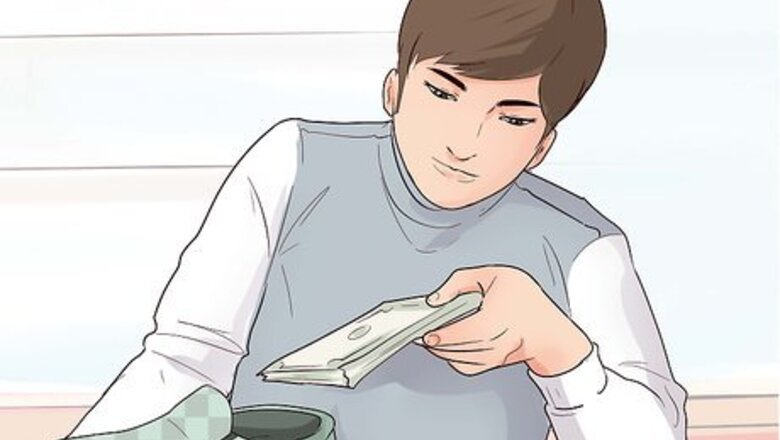
views
Hiding Cash on Your Person
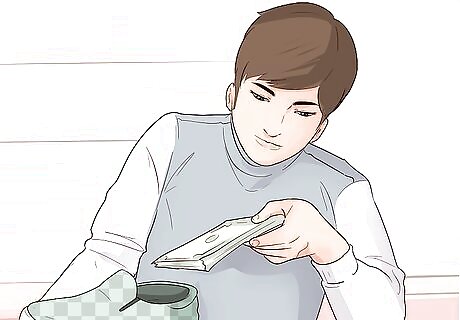
Put it in your shoe or your underwear. If you're in a sketchy area and you want to keep your cash safe in case you get mugged, the two best places are your shoe and your underwear. If you're traveling somewhere unfamiliar, this is a good idea to make sure you keep your cash safe. Women can safely cup a few bills inside bras, while men will usually need to hide bills in their undershorts. The waist-band is a good bet, but it can become unloosed quite easily. If you can, sew a pocket into a pair of undershorts to keep your money secure, or use a paperclip to clip it to the hem. Head to the bathroom before you get your cash out obviously. Don't just start digging in your nether regions.
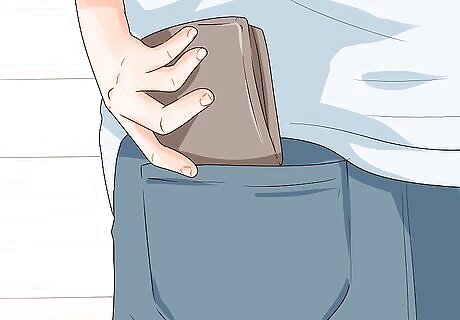
Carry a fake wallet. If you're hiding money on your body, another common trick is to load up a cheap "fake" wallet and put it in a regular place. This way, if you attract the attention of a thief or pick-pocket, they're likely to come up empty-handed. Instead of putting credit cards inside, put old grocery store membership cards, or expired cards or some kind. Instead of cash, put monopoly money, or just a dollar or two. Keep it visible in your purse, and easily accessible if you're a woman, or put it in your back pocket if you're a guy.
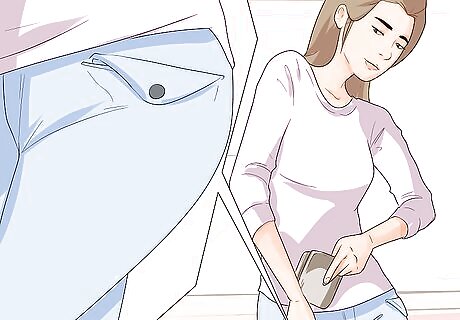
Wear pants with pocket fasteners. Some pants come with clips or ties that you can use to keep your money secure in your pockets, secured in one of the front pockets. If you're traveling, this is an excellent way to keep yourself from being robbed. Likewise, wallet chains are a common accessory in many areas, letting you turn any pair of pants into a secure pair. Pants with buttons on the pockets are somewhat effective, but less so than pants specifically outfitted with clips for the money. Use some combination of methods for the best protection.
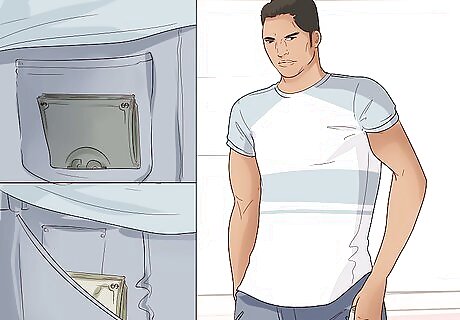
Keep your money in different places. Even with your money in an unusual place, it's not so secure if it's all in one place. If a thief finds a few bucks in your pocket, that won't be such a big deal if you've got a couple hundred split between both shoes, your bag, your undies, and sewed into the head of your hat. Keep 'em guessing.
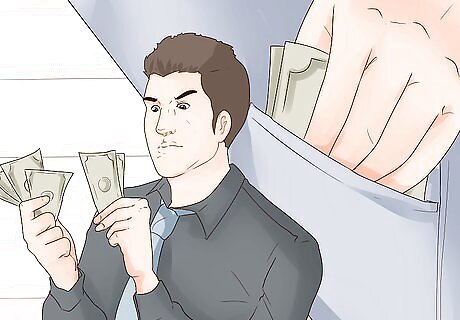
Carry as much cash as you'll need. One of the best ways to keep yourself from getting robbed? Carry less cash on your person and you'll attract less attention. Try to only carry what you'll need for a specific outing, or event, and then leave the rest of your cash at home, or better yet, in the bank. If you can, try using a card for as many purchases as possible. If you don't have any, you can't be robbed.
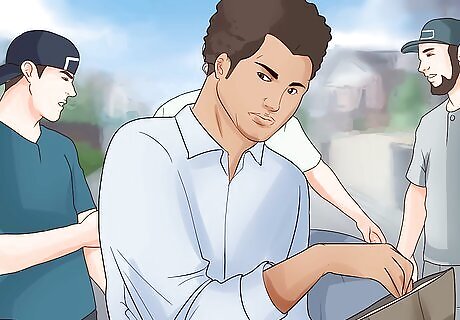
Guard the money you have. If you're in an unfamiliar place, try to keep the amount of money you have on you a secret. Don't show anyone the inside of your wallet or purse, and don't flash around big stacks of cash if you don't want to attract unwanted attention from thieves. If you get change, just put it into one pocket and put it into your wallet later when you get the chance in private. Don't stand there fiddling with all your cash, or walking around with your wallet out.
Hiding Cash Around the House

Hide it in different books. If you've got a lot of books, they're one of the easiest and best places to hide a little bit of money. Hide a few dollars at a time in a few different books on your shelf. It's uncommon for thieves to mess around with literature. Pick a specific page to put cash in with your books. If you've got a lot of money to hide, you might try doing it at your favorite page in a bunch of books. Pick page 88 for Reggie Wayne's number, or whoever your favorite player is, and you'll always remember. It can be easy to lose cash, so this is a good way to help yourself remember. If you've got too much cash, use an X-Acto knife to cut out a cash-sized divot in the pages of a big book. Get a significant one, like Adam Smith's The Wealth of Nations, and cut out a rectangle from the middle of the pages, so a stack of cash will nestle easily into the interior. Video game cases, DVD cases, and other types of cases can be a great alternative to books, if you don't have many laying around. Fill your old VHS sleeve of "Money Train" with actual cash.
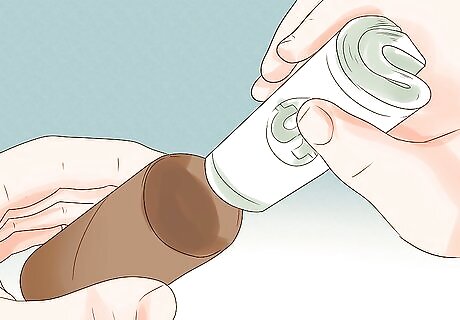
Hide it inside a toilet paper roll. Roll up a fat stack and stick it in the middle of a toilet paper roll to hide it. Robbers aren't usually in the business of messing around with the TP too much. Mark the money roll with a little dot of marker somewhere that only you'll recognize. This way, you won't try to use that roll and you'll be able to quickly find it among all the others.
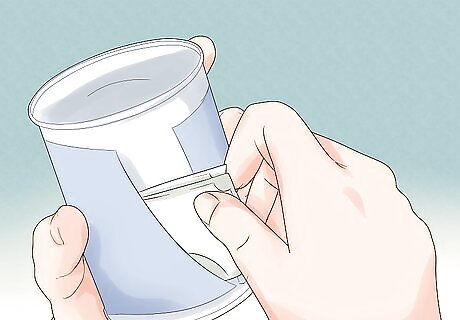
Hide it in boxes of food or other products. Pick something that you've had in your cabinet forever and have never eaten, and are unlikely to eat in the next ten years, and use it as a hiding place for cash. Here are some ideas: Peel the label back and hide it under the label of a can of soup Under cookies in a tin, or in a cookie jar In a box of tampons or condoms Buried in some decaf coffee grounds Between the bag and the box of cereal Inside an empty baking soda box in the fridge
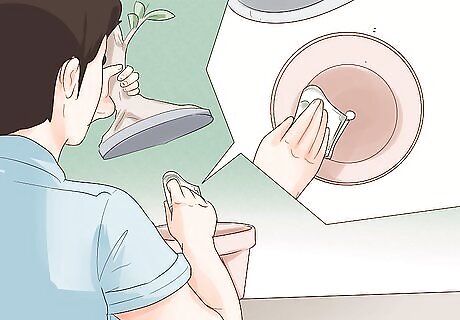
Keep it in a fake plant or other household object. Aside from the kitchen, there are lots of other places around the house that you can hide a wad of cash from prying eyes. Try out a couple of these ideas: Inside a guitar, or an instrument case Under a lamp Behind a picture in a frame In a box of puzzle pieces In an old pair of shoes Behind a poster on the wall
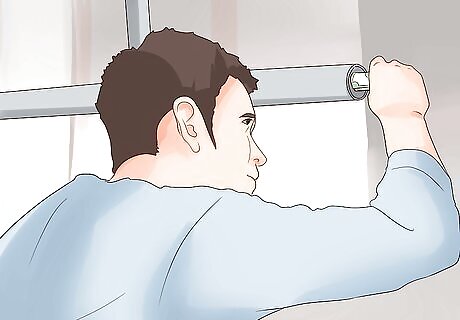
Build a fake pipe or wall fixture. If you want to build your own money hiding place, head to the basement and find a good place to install an extra pipe where you don't need one, or a good place to install a couple of extra tiles loosely, that you'll be able to slot some cash behind if you need to. Find a real pipe-fitting in your basement and buy an identical pipe, then fix it adjacent to the plumbing. Leave one end open and put some cash in it. Mark it with a marker for easy access. Loosen some trim along the bottom of one corner of the floor, and pull it away. Keep cash behind the trim and put it back into place, fixed with putty or tacky glue.
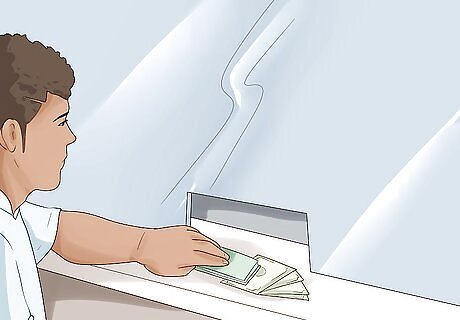
Put it in the bank. The best way to keep your money safe? Put it in the bank and only take it out when you need some. Money in the bank is insured against theft and secure. You don't have to worry about losing money that's in the bank. It's always the safest idea. Open a few different accounts if you want to spread out your wealth and make it more difficult to find. Check out the next section for more information about hiding funds for tax purposes.
Hiding Money from Taxes

Set up an irrevocable trust. If you have a lot of money that you want to guard from creditors or the federal government, setting up a trust for a loved one is a good option. Irrevocable trusts are technically the property of the person to whom you sign them over, but you may still retain the lifetime rights of use. You'll essentially be able to give up your property or investment, while also being allowed to use it, while not being accountable for taxes on it. Talk to your financial advisor about setting up an appropriate trust. Once you set up an irrevocable trust, the terms are unmodifiable, meaning that you can't go back on it. It's important to get the terms right the first time, so consult a professional to help you name a trustee.

Open an offshore bank account. Keeping money in other countries with more lenient tax codes is a notorious way of hiding funds from the government. The Cayman Islands, The Philippines, Switzerland, and the Isle of Man are all known for being tax havens for the super-rich. Banks do sometimes fail. Developing countries often offer extremely lenient tax laws as a way of attracting wealthy investors. This can be a dangerous gamble. Never dump 100% of your savings into an offshore account, or you risk a devastating loss.

Set up a homestead for an exemption. Homesteading is a principle of land ownership by appropriation. In the United States, some states have very generous homesteading laws, which keeps a property that has been in your family for a certain amount of time safe from creditors. Florida, in particular, has generous laws keeping long-term residents of homesteads safe from creditors. Homesteading usually has a "back to the land" connotation, but it really has to do with your rights as a land owner. If you live in the US, learn more about your local homesteading laws here.
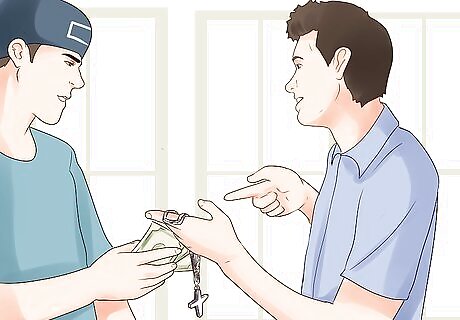
Keep your money in precious metals. Gold, metal, and platinum are sometimes thought to be a more secure long-term investment than keeping your money in the bank. Though they are somewhat variable in terms of their cash-value, it's usually thought that in the event of a total bank collapse, the gold-standard will be the safe way to go in the future. It's pretty difficult to cash in your gold in the meantime. Investing in precious metals might make your money secure, but it might be so secure that you can't actually use it.
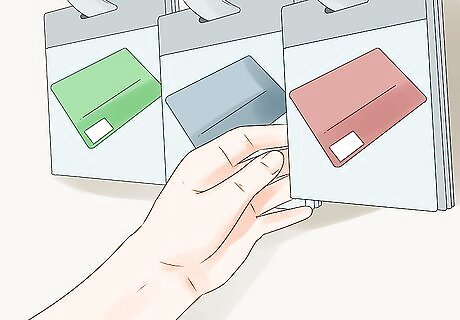
Buy prepaid gift cards. If you've got a lot of cash but don't want to declare it for tax purposes, it's ok to buy prepaid gift cards and instead use those to make purchases. Gift cards are widely available for lots of purposes, and you can use them to buy gas, groceries, and more store-specific items. This tactic is common among drug traffickers, some even going so far as to explore off-shore debit options that go much higher than the usual $250 limit for gift cards. Buying traditional pre-pay debit cards will typically require you to provide other information, including a social security number. If you have to provide any of this information, it won't be an effective technique.













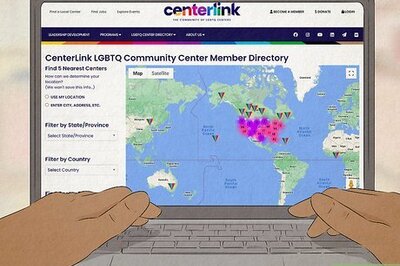






Comments
0 comment